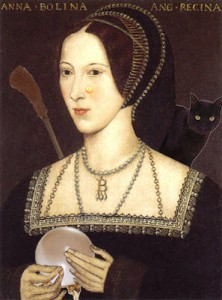 There’s no denying that Anne Boleyn is the most maligned and misunderstood of Henry VIII’s six wives. Even today, in an age where we have unprecedented access to primary sources and the likes of historians Eric Ives and Alison Weir spreading the message that Anne Boleyn was innocent and framed, Anne Boleyn is still misrepresented in fiction, non-fiction, TV programmes, movies, radio shows, podcasts and online. I am regularly asked why I feel the need to dedicate my time to researching and writing about an historical character who was a traitor to the crown and a homewrecker – aaaggghhh!
There’s no denying that Anne Boleyn is the most maligned and misunderstood of Henry VIII’s six wives. Even today, in an age where we have unprecedented access to primary sources and the likes of historians Eric Ives and Alison Weir spreading the message that Anne Boleyn was innocent and framed, Anne Boleyn is still misrepresented in fiction, non-fiction, TV programmes, movies, radio shows, podcasts and online. I am regularly asked why I feel the need to dedicate my time to researching and writing about an historical character who was a traitor to the crown and a homewrecker – aaaggghhh!
So, what are the labels that Anne Boleyn is wrongly given?
- wh*re – The imperial ambassador never referred to Anne Boleyn by name and instead called her “the concubine”, “the she-devil” and “the wh*re”, the Abbot of Whitby called her “Common stewed [professional] wh*re”, a lady called Margaret Chanseler (quoted in Eric Ives “The Life and Death of Anne Boleyn”, p200) referred to Anne as “The Goggle Eyed wh*re” and she was also known as “The Great wh*re”, “The King’s wh*re” and a “naught paike”!
- “The Scandal of Christendom” – This is what Catherine of Aragon called Anne.
- Homewrecker or the other woman – This is the kind of label you see in Team Catherine vs Team Anne type arguments. People who give Anne this label feel that Anne purposely broke up Henry’s marriage to Catherine.
- Seductress, plotter, tease and sexual predator – The belief that Anne Boleyn set out to purposely seduce and trap Henry VIII so that she could be queen.
- Poisoner – In “The Other Boleyn Girl”, Philippa Gregory, suggests that Anne poisoned Bishop Fisher and his dinner guests, Cardinal Wolsey and Catherine of Aragon.
- Witch – The idea that Anne Boleyn was a witch who put Henry under a spell. If you are eagle-eyed, you will have spotted Anne Boleyn’s portrait on the wall of Hogwarts in the first Harry Potter film, “Harry Potter and the Philosopher’s Stone” (The Sorcerer’s Stone).
- Deformed – Nicholas Sander, a Catholic recusant in Elizabeth I’s reign, wrote of Anne Boleyn having six fingers, a projecting tooth and a large wen under her chin.
- Adulteress – Anne was charged with adultery and incest and some people believe that ‘there’s no smoke without a fire’.
- Traitor – She was executed as a traitor, as someone who had not only committed adultery and slept with her brother, but also as someone who had plotted against the king.
- Bigamist – In “The Other Boleyn Girl”, Anne Boleyn marries Henry Percy and they consummate their union, therefore, according to Philippa Gregory, Anne was a bigamist.
- Kidnapper – In “The Other Boleyn Girl” (do you get the idea that many of the stereotypes and labels can be blamed on this novel?!), Anne adopts her sister Mary’s son, Henry, without Mary’s permission. She steals him.
- That she gave birth to a monster – The idea that Anne gave birth to a monstrously deformed baby and that this was a sign that she had committed incest or was a witch.
And I’m sure you can think of more.
But those who seek to avenge Anne Boleyn also make her out to be someone she is not:-
- Protestant martyr and saint – One website (Reformation.org) claims that Anne’s “only ‘crime’ was breaking up an incestuous relationship between King Henry VIII and Catherine of Aragon”, that her death was part of a conspiracy to keep England under the Catholic Church, that her doctor made sure that she did not have a male heir and that Anne should therefore be seen as a saint and martyr.
- Victim of poison – The same website I mentioned a minute ago speaks of how Anne was given the cantarella of Borgia (poison) to make her miscarry.
- A Sibyl or prophetess – I heard that one radio show on Anne Boleyn was claiming that Margaret of Austria ran a spiritual academy for sibyls (seeresses and prophetesses), a Renaissance version of Hogwarts, and that Anne was educated as a sibyl and groomed to be queen.
- The Leader of the Reformation in England – Some people believe that not only was Anne groomed to be queen by the likes of Margaret of Austria and Marguerite of Angoulême, but that she was also groomed to break the Catholic Church in England and lead the Reformation.
- Vampire – I had to add this as there seems to be a trend at the moment in fiction for Tudor characters to be portrayed as vampires. A kind of Twilight meets Sookie Stackhouse meets The Other Boleyn Girl! Hmm…
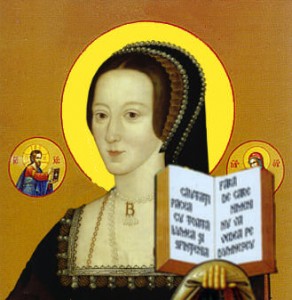
Reading through that list, I’m not sure which is worse: the labels given to her by those who sought (or seek) to discredit her or the ones used by Anne Boleyn “avengers”!
Obviously, at the end of the day, we are never going to know who the real Anne Boleyn was because we just don’t have the primary sources to give is that full pictures. Our theories, and those of historians and academics, are just that, theories, based on our interpretation of the sources and if you look at how two esteemed historians like Eric Ives and G W Bernard can disagree over Anne, then you can see what a minefield the subject of Anne Boleyn is. Anyway, I digress, let’s look at these labels and the truth behind them…
Anne Boleyn the wh*re
It’s easy to understand why Eustace Chapuys would label Anne “the wh*re” or “the concubine” because his allegiance was with Charles V, Catherine of Aragon’s nephew, and therefore with Catherine and Mary. In his opinion, Anne was the evil other woman, the woman who had led Henry VIII astray, and he did not recognise their marriage. Also, think about the general public, the people who had had Catherine as their queen for over 20 years. She was well respected and popular and Anne, in their opinion, had usurped her position. Just think about the public’s reaction to Camilla Parker-Bowles when they found out that Prince Charles had always loved her and had spent his honeymoon with Diana ringing Camilla. Also consider that the royal family are concerned that Camilla will never be recognised as queen by the British public, yet we are in the 21st century, a time where divorce is a fact of life. I know it’s not quite the same, but it does help us to understand people’s reaction to Anne Boleyn and the fact that she was labelled a wh*re, even though it is pretty clear that she was a virtuous woman who tried to refuse the King’s advances.
The Scandal of Christendom
An understandable reaction from Catherine, she’s not exactly going to praise the woman who has caught her husband’s eye and who is the cause of all her woes. Just look at what happened to Catherine and her daughter, it’s easy to see why they held Anne accountable for the annulment, their loss of status and the cruel treatment they suffered. Once Anne was dead and gone, Mary had a rude awakening when she realised that it was her father who was ultimately responsible for her treatment, when things got worse instead of better. It is understandable that Catherine blamed Anne because she loved her husband and Mary loved her father, but it doesn’t make their assessment of Anne a true one. Now, I’m not trying to paint Anne as a angel, as she certainly was not, she said spiteful things and she flew into rages, making rash threats against Catherine and Mary, but we have to hold Henry accountable for what happened to these women really.
Homewrecker
The people who label Anne as a “homewrecker” are people who look at the love triangle with 21st century eyes. What we have to remember is:-
- There were rumours of Henry VIII annulling his marriage to Catherine in 1514, long before Anne came on the scene and he had already stopped sleeping with his wife.
- Anne did not chase Henry, she did not initiate the affair and she actually said “no” to begin with.
- Henry had already concluded that his marriage was not valid or legal, that it was incestuous.
- Anne had no choice – She tried saying no and it didn’t work, she tried retreating to Hever and that didn’t work, Henry always got what he wanted and he was the King.
So, please let’s blame Henry for the deterioration and subsequent end of his marriage, not Anne Boleyn.
Sexual Predator
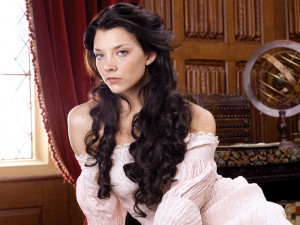
I think this idea stems from books and films like “The Other Boleyn Girl”, where we see Anne purposely throwing herself at Henry VIII while Mary is pregnant so that the Boleyns still have influence. In the book, Elizabeth Boleyn says of Anne, “Thank God Anne has him in her toils. She plays with him like you might tease the queen’s dog. She has him on a thread” and we come away with the idea that Henry is powerless and that Anne’s sexuality gives her all the power, that she is calling the shots. Well, anyone who knows anything about a woman’s place in Tudor England and about Henry VIII knows that although Anne may have been an influence on Henry she certainly was not the one pulling the strings.
Author Karen Lindsey (“Divorced, Beheaded, Survived: A Feminist Reinterpretation of the Wives of Henry VIII”) goes as far as to say that Anne Boleyn could have been the victim of sexual harassment. Henry was infatuated with Anne, he wrote her 17 letters, when he usually hated writing, and he complains in those letters about Anne not replying to him and rejecting his advances:-
“Today, Henry’s approach to Anne would be instantly identifiable as sexual harassment. Anne however, had no social or legal recourse against a the man who ruled the country. She continued, as so many women before and since have done, to dodge her pursuer’s advances while sparing his feelings. It didn’t work… It was a hellish position. Could she really tell the king to his face that she had no interest in him? She could reiterate her desire to keep her chastity and her honor, but clearly he didn’t respect that. She could ignore his letters and stay away from court, but he refused to take the hint. To offer him the outright insult he asked for would be to risk not only her own but her father’s and brother’s careers at court. She undoubtedly kept hoping he would tire of the chase and transfer his attentions to some newer lady-in-waiting.
But he didn’t and she was trapped: there was no chance of her making a good marriage when every eligible nobleman knew the king wanted her. She began to realize she would have to give in. [as Wyatt wrote in his poem ‘Whoso list to hunt’] ‘Nole me tangere, for Caesar’s I am’.
Virtually every account of Anne’s story cites the poem, yet its central image is ignored. Anne was a creature being hunted, and hunted by the king — like the buck he had killed and so proudly sent to her. There could be no refuge from the royal assault; no one would risk protecting her from Henry’s chase. She could run, hide, dodge for a time, but the royal hunter would eventually track down his prey. And he would destroy her. The hunt was not an archaic metaphor in sixteenth century life, it was a vivid integral part of that life and everyone knew what happened to the wild creature at the end.”
In my opinion, Anne was definitely more prey than predator. Henry fell for her and he wanted her, he was not used to someone saying no to him and did not give up, he pursued her relentlessly. Of course, we don’t know what Anne’s feelings were, as we only have his letters, but it is clear from those that he had to persuade her into the relationship. However, I don’t see Anne as a victim of sexual harassment, just the object of a very passionate man’s affections, and I think she was flattered by him and then fell in love with him. They shared many interests and they were very alike at that time, so it was a very natural partnership.
Poisoner and Murderess
In “The Other Boleyn Girl” book, Mary Boleyn is told by her husband, “She [Anne] poisoned Bishop Fisher, poor sainted man, and she has the deaths of three innocent men on her conscience for that. She poisoned Cardinal Wolsey and Queen Katherine…” and in her notes on the book Philippa Gregory writes of how Anne Boleyn was guilty of at least one murder – who? There is absolutely no evidence that Anne tried to poison anyone and she was not charged with murder or attempted murder at her trial. There were rumours that Catherine of Aragon had died of poisoning after it was found that her heart was black and that her illness had worsened after drinking some Welsh ale, and, after Anne’s fall, Henry VIII led Henry Fitzroy to believe that Anne had planned to poison him and his half-sister, Mary, but there was no basis to these accusations. Catherine died of cancer and Henry VIII was just ranting and blustering – he also spoke of Anne having 100 lovers!
A Witch with Six Fingers
OK, just because Anne Boleyn’s portrait is on the wall at Hogwarts it does not mean that she was really a witch – ha! Seriously, although Henry VIII said to a courtier that he had been “seduced and constrained by sortilèges“, sortilèges meaning “sorcery, spells or charms”, and that his marriage must be cursed because he had not been blessed with a son, it does not mean that he believed that Anne was a witch. In her book “1536: The Year that Changed Henry VIII”, Suzannah Lipscomb writes of how, at the time, “sortilèges” meant “divination” and that Henry could have meant that he “was persuaded into the marriage by the premarital prophecies that Anne would bear sons” or that Henry could simply have been referring to his infatuation with Anne, how she had bewitched him, entranced him.
In “The Rise and Fall of Anne Boleyn”, Retha Warnicke writes of how Anne Boleyn gave birth to a deformed foetus in 1536, what Nicholas Sander describes as a “shapeless mass of flesh”, and that this was a sign that Anne used witchcraft and that she had committed some kind of sexual sin. When we combine that with the fact that Sander describes Anne as having six fingers, a projecting tooth and a wen under her chin, then it makes us wonder where she hid the black cat and broomstick!
There is a “but” of course, and it’s a big but – BUT, there is NO evidence that Anne miscarried a deformed foetus or that she had six fingers etc etc! Nicholas Sander did not even know Anne (he was born around 1530) and he was a Catholic recusant writing during the reign of Anne’s daughter, Elizabeth I. His aim was to discredit Elizabeth by blackening her mother’s name. Surely, the rather paranoid and vain Henry VIII would not have considered marrying a disfigured woman, never mind breaking with Rome for her, and you would think that Chapuys would have joyously spread the news of Anne’s monstrous baby, rather than describing it as a male child of around 3 and a half months in gestation. Need I say more!
Adulteress and Traitor
At her trial, on the 15th May 1536, Anne Boleyn was accused of incest, adultery, promising to marry Norris after the King’s death, conspiring the King’s death and laughing at the King and his dress. Although Anne protested her innocence, a jury of her peers (or rather her enemies!) found her guilty and she was sentenced to death. The men that she was said to have committed adultery with had already been found guilty, so her trial was completely prejudiced, and the executioner had been ordered from Calais before her trial had even taken place.
You can read more about my thoughts on why I feel that this trial was a show trial and that Anne had no hope of justice in my article “A Foregone Conclusion”, but if you consider that the dates of Anne’s offences listed in the indictment make no sense, that even the man who called her “the concubine” did not believe she was guilty, that Henry was off gallivanting with ladies (and Jane Seymour) and that Anne’s household was broken up before the trial, her guilt was definitely a foregone conclusion. The majority of historians believe that Anne was innocent and that she was framed, I agree wholeheartedly.
Bigamist
No! Anne may have been in love with Henry Percy and the couple may well have been planning to marry BUT Cardinal Wolsey and Percy’s father, the Earl of Northumberland, put a stop to the relationship and Percy was married off to Mary Talbot. According to a letter written by Chapuys in July 1532, Henry Percy had to deny, in front of the whole council, that there had been a pre-contract between himself and Anne Boleyn, after his wife reported that he had claimed, during a quarrel, that their marriage was not real because he had been legally contracted to Anne Boleyn. Percy also denied the pre-contract in 1536 when Archbishop Cranmer questioned him. There is, therefore, no evidence that Anne and Percy had been pre-contracted or that they had consummated their union (à la “The Other Boleyn Girl”).
Kidnapper
Another “The Other Boleyn Girl” misrepresentation of Anne. In the book, after the death of Mary Boleyn’s first husband, Anne Boleyn adopts Mary’s son, Henry Carey, without Mary’s permission, she takes Mary’s beloved son and Mary says, “She takes everything… She has always taken everything. But I will never forgive her this.” The truth behind this accusation is that Henry VIII appointed Anne Boleyn as Henry Carey’s guardian in 1528, after the death of his father, William Carey. This was nothing unusual. Mary Boleyn Was a widow and Anne was in a position to provide for Mary’s son and to ensure that he had a good education. As Anne Boleyn Files visitor, Rachel Fitzpatrick pointed out, in a discussion we had on Facebook, that it was standard practice for the King to grant wardships to wealthy and influential courtiers, for example, Lady Jane Grey was Thomas Seymour’s ward and Catherine Willoughby was Charles Brandon’s.
Protestant Martyr and Saint
As I said earlier, Reformation.org call Anne Saint Anne Boleyn and write of how her story mirrors that of the Biblical Queen Esther:-
“Like her Old Testament counterpart Queen Esther, Queen Anne risked her life to tell Henry the good news of the Gospel of Christ. All the time she was carefully watched by wolves like Cardinal Wolsey and Sir Thomas More.”
The martryologist, John Foxe, wrote of Anne Boleyn in his Book of Martyrs (Actes and Monuments):-
“Godly I call her, for sundry respects, whatsoever the cause was, or quarrel objected against her. First, her last words spoken at her death declared no less her sincere faith and trust in Christ, than did her quiet modesty utter forth the goodness of the cause and matter, whatsoever it was. Besides that to such as wisely can judge upon cases occurrent, this also may seem to give a great clearing unto her, that the king, the third day after, was married in his whites unto another. Certain this was, that for the rare and singular gifts of her mind, so well instructed, and given toward God, with such a fervent desire unto the truth and setting forth of sincere religion, joined with like gentleness, modesty, and pity toward all men, there have not many such queens before her borne the crown of England. Principally this one commendation she left behind her, that during her life, the religion of Christ most happily flourished, and had a right prosperous course.”
But however much we admire Anne and however much she helped to promote reformist ideas and encourage the reading of the English Bible, she did not die because of her faith. Dictionary.com defines “martyr” (in the sense we mean) as:-
- A person who willingly suffers death rather than renounce his or her religion.
- A person who is put to death or endures great suffering on behalf of any belief, principle, or cause: a martyr to the cause of social justice.
Do either of those definitions describe Anne? No, they don’t.
Also, Anne Boleyn did not risk her life by smuggling reformist books into England, her father and brother did that.
Victim of Poison
What is it with Anne Boleyn and poison?! Despite Reformation.org’s claim that Anne’s miscarriages were caused by poison, there is absolutely no evidence that her miscarriages were anything but bad luck. The same site also claims that Catherine of Aragon’s was “shut up” by God to prevent her having male children as her marriage to Henry was incestuous. I applaud the site for its passion but it does not present any evidence for its wild claims.
A Sibyl or Prophetess
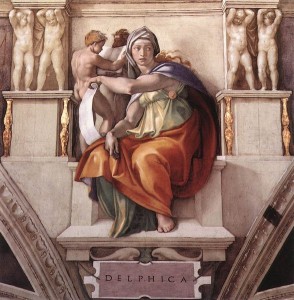
Another outrageous claim! For those of you who have not got a clue what a “sibyl”, Dictionary.com define a sibyl as
- Any of certain women of antiquity reputed to possess powers of prophecy or divination.
- A female prophet or witch.
As I have said, the radio show I heard about was claiming that Margaret of Austria ran a special school for gifted girls and women, for sibyls, and that Anne was one of those women. At Margaret’s school, Anne was also encourage to fulfil her destiny and groomed to be Queen of England. Now, Anne Boleyn went to the court of Margaret of Austria in 1513, just 4 years after Henry’s marriage to Catherine of Aragon and a time when Catherine was fertile and was getting pregnant. Obviously we are meant to think that as a sibyl Anne knew her destiny, but there was no hint then that Henry would give up Catherine. To me this claim is just way off base. What do you think?
Leader of the Reformation
In my article, “Anne Boleyn: The Myths and Bad History”, I quoted playwright Howard Brenton as saying that Anne Boleyn was “a Joan of Arc, driven by religious vision” and in his play he certainly does paint her as a brave reformer who changed English history. Well, I agree that Anne had courage, that she had reformist views, that she owned books that could have got her condemned as a heretic, that she influenced the appointment of reformist bishops and that she had a genuine strong faith, but I would not say that she led the English Reformation or, as I heard someone claim, that she broke the Catholic Church in England. I stand by what I said in that article:-
“We also have to remember that Anne Boleyn was no Protestant, that label did not even exist then. She may have been a catalyst of the English Reformation and influenced Henry VIII with her ‘heretical’ reading material, but she was reformist rather than Protestant and she died in the Catholic faith. As my good friend, Olivia Peyton, said to me: ‘Anne Boleyn did not want to throw the baby out with the bathwater’, meaning that Anne could see that the Catholic Church was fundamentally ok, she did not reject the established religion and its rituals, but she realised that reform was required – the church needed some work! Anne’s almoner, John Skip, defended the ceremonies and rituals of the Catholic church in a sermon supported by Anne, defending them as aids to memory rather than the belief that they had sacred power. Eric Ives points out too that the reformist literature Anne was reading was not necessarily challenging the belief in transsubstantiation, that Christ’s body was present in the consecrated host, but instead was challenging “the late medieval focus on the miraculous mechanism of the mass rather than its significance”.
Eric Ives explains that:-
“Her attitude would be characteristic of all shades of English evangelical reform for at least a decade more: real spiritual experience, yes; the priority of faith, yes; access to the Bible, yes; reform of abuses and superstition, yes; but heretical views on the miracle of the altar, no.” “
Vampire
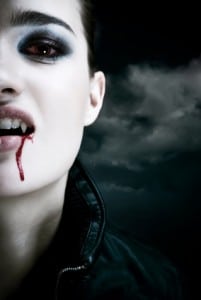 Do I really need to argue the case against this one? One recent vampire book had Anne Boleyn being hanged as obviously you cannot be a vampire if you have been decapitated. As much as I’d love to imagine Anne as a kick-ass vampire causing havoc in Tudor England, it’s just not Anne is it! I love historical fiction and I love vampire novels but that doesn’t mean that I love Tudor vampire books!
Do I really need to argue the case against this one? One recent vampire book had Anne Boleyn being hanged as obviously you cannot be a vampire if you have been decapitated. As much as I’d love to imagine Anne as a kick-ass vampire causing havoc in Tudor England, it’s just not Anne is it! I love historical fiction and I love vampire novels but that doesn’t mean that I love Tudor vampire books!
Conclusion
So, where does all this leave us? Who was the real Anne Boleyn? What was she really like? Well, she didn’t fit into any of the above labels and stereotypes! The real Anne Boleyn for me is the one Eric Ives describes so eloquently in his book “The Life and Death of Anne Boleyn”. As I read about her background, her relationship with Henry, her reaction to the birth of Elizabeth, her love of fashion, art and culture, her strong faith, her downfall and the courage and dignity with which she faced her last days, I see glimpses of the real Anne Boleyn and begin to know her. She is a puzzle and always will be, she is an enigma and we will never know the entire truth about her, history won’t let us, the sources are not there.
What we do know is that she wasn’t an angel or a saint, but she also was not the devil incarnate. She was a woman who was passionate, intelligent, forward-thinking, hot-tempered, reckless at times and also quite spiteful. She didn’t care what people thought of her (“let them grumble”), she tossed around empty threats and had a cruel streak (she ordered that Mary’s ears be boxed if she didn’t start toeing the line), she had heated arguments with her husband and was not afraid to question his judgement and disagree with him, she was jealous, she was insecure, she had reformist ideas but was not a radical. Although I admit to admiring her and being obsessed with her and her story, I’m not sure, if she was alive today, that we would be friends, I’m not sure I could cope with her mood swings and I think she was more comfortable in the presence of men.
Anne Boleyn is different things to different people and the puzzle of her story allows us to form her into what we want her to be and to love and admire her with a passion. Even today, she is causing arguments and heated debates, provoking strong reactions; and perhaps now, more than ever, inspiring people to write books and produce art and craft dedicated to her. She is like a modern day celebrity in that way, yet she lived over 450 years ago. Anne Boleyn is an icon.
What do you think? Who is your Anne Boleyn?